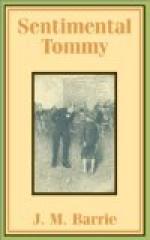“She’s dying, man!” he cried.
“Let her die!” answered Aaron.
In an hour the sensational news was through half of Thrums, of which Monypenny may be regarded as a broken piece, left behind, like the dot of quicksilver in the tube, to show how high the town once rose. Some could only rejoice at first in the down-come of Jean Myles, but most blamed the smith (and himself among them) for not taking note of her address, so that Thrums Street could be informed of it and sent to her relief. For Blinder alone believed that Aaron would be softened.
“It was twa threads the smith saw him break,” the blind man said, “and Aaron’s good at his work. He’ll go to London, I tell you.”
“You forget, Blinders, that he was warping afore I was a dozen steps frae the door.”
“Ay, and that just proves he hadna burned the letter, for he hadna time. If he didna do it at the first impulse, he’ll no do it now.”
Every little while the boys were sent along the road to look in at Aaron’s end window and report.
At seven in the evening Aaron had not left his box, and the blind man’s reputation for seeing farther than those with eyes was fallen low.
“It’s a good sign,” he insisted, nevertheless. “It shows his mind’s troubled, for he usually louses at six.”
By eight the news was that Aaron had left his mill and was sitting staring at his kitchen fire.
“He’s thinking o’ Inverquharity and the cushie doos,” said Blinder.
“More likely,” said Dite Deuchars, “he’s thinking o’ the Cuttle Well.”
Corp Shiach clattered along the road about nine to say that Aaron Latta was putting on his blacks as if for a journey.
At once the blind man’s reputation rose on stilts. It fell flat, however, before the ten-o’clock bell rang, when three of the Auchterlonie children, each pulling the others back that he might arrive first, announced that Aaron had put on his corduroys again, and was back at the mill.
“That settles it,” was everyone’s good-night to Blinder, but he only answered thoughtfully, “There’s a fierce fight going on, my billies.”
Next morning when his niece was shaving the blind man, the razor had to travel over a triumphant smirk which would not explain itself to womankind, Blinder being a man who could bide his time. The time came when the smith looked in to say, “Should I gang yont to Aaron’s and see if he’ll give me the puir woman’s address?”
“No, I wouldna advise that,” answered Blinder, cleverly concealing his elation, “for Aaron Latta’s awa’ to London.”
“What! How can you ken?”
“I heard him go by in the night.”
“It’s no possible!”
“I kent his foot.”
“You’re sure it was Aaron?”
Blinder did not consider the question worth answering, his sharpness at recognizing friends by their tread being proved. Sometimes he may have carried his pretensions too far. Many granted that he could tell when a doctor went by, when a lawyer, when a thatcher, when a herd, and this is conceivable, for all callings have their walk. But he was regarded as uncanny when he claimed not only to know ministers in this way, but to be able to distinguish between the steps of the different denominations.




